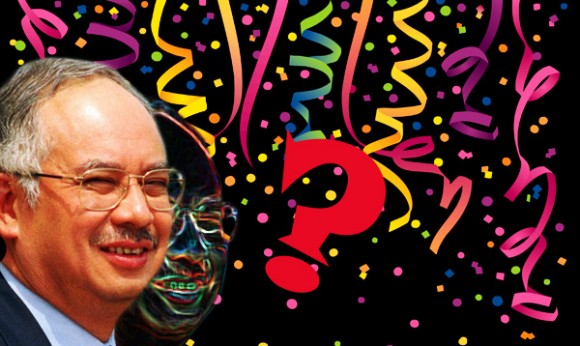
THE next general election will be Prime Minister Datuk Seri Najib Razak’s first election as head of the Barisan Nasional (BN). Najib will also be leading the BN into its first general election after its worst election performance in March 2008.
The Nut Graph asks political scientist Dr Wong Chin Huat on how well Najib has prepared the BN for the next election, and how his leadership will continue should the BN be re-elected into power.
TNG: What has Najib done right to prepare the BN for the next general election? What opportunities has he let slip by?
The only thing Najib has done right is set the direction, as captured by his 1Malaysia slogan. He knows what Malaysians want: reform and moderation as a workable alternative to former Prime Minister Tun Dr Mahathir Mohamad’s arrogant authoritarianism.
Najib was well poised to offer this. Prime Minister Tun Abdullah Ahmad Badawi had proved to be a disappointment. Opposition Leader Datuk Seri Anwar Ibrahim offers too many uncertainties, both him and his coalition.
However, Najib failed to live up to his own slogan. In that sense, he is just a more energetic but more tainted Abdullah.
Najib not only let opportunities slip by, he also alienated the public, especially the urban middle class. On 6 Feb, it will be the third anniversary of the Perak constitutional coup. His smiling face with the four defected lawmakers will go down in a generation’s memory. Altantuya Shaariibuu’s murder aside, his rule will also be associated with three political deaths that occurred during his tenure: Teoh Beng Hock, Ahmad Sarbani Mohamad and Baharudin Ahmad.
His greatest missed opportunity is of course the 9 July Bersih 2.0 rally. He could have just allowed it. Instead, the police cracked down on the rally like a colonial army, turning Bersih 2.0 from a movement of democratisation to also one of civic nationalism.
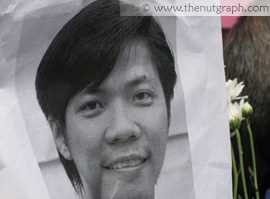
Another missed opportunity was Teoh Beng Hock’s death. If those responsible for his death had been quickly prosecuted, many would have believed that the tragedy was caused by some little Napoleons. Instead, rumours now linger that there were instructions from the top.
The list of missed opportunities goes on – the student movement, the National Feedlot Corporation, the Christian state conspiracy, the Sarawak election, the church arson attacks following the Allah controversy, the cow-head protest.
If he had put his foot down, he would have alienated the hawks within his party, but many middle-ground voters would believe in his reforms, which is his intended positioning. Even if they don’t vote for him, they may not feel compelled to vote against him. This is not the case today.
Najib appears to be making attempts to appear as a reformer and a moderate ahead of general elections largely expected this year. If the BN does win and with a comfortable majority, what do you think he will do with his extended term as prime minister? Judging from his track record, is he likely to become more serious about reform?
It depends on how many seats the BN can win and where they come from.
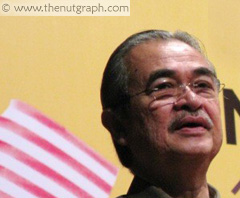
If Najib wins a two-thirds majority, you can kiss goodbye to any reform. It will be like a replay of the 2004 landslide for Abdullah. A two-thirds majority would probably mean that the opposition would have lost significant ground in the Malay Malaysian heartlands and some mixed areas.
If Najib is a strong and decisive leader like Mahathir in 1990, he would push forward reforms to win back lost ground. This would help win back urban and Chinese Malaysian voters, or at least arrest their desertion. But Najib is a flip-flop leader like Abdullah, trying to please everybody. So Ibrahim Ali, Utusan Malaysia and Umno hawks will claim credit for a big win. They would play up ethno-religious issues even more to further charge into Parti Keadilan Rakyat (PKR)’s or PAS’s constituencies. If possible, Umno might even stage another Perak coup.
If the BN wins without a two-thirds majority, but keeps most of their seats in Peninsular Malaysia, then the zest to undermine the opposition with far-right politics and defections would continue.
Is genuine reform then impossible under a Najib-led BN government?
Najib may be pushed to be serious about reforms – much like Abdullah after 2008 – if the BN wins the election but loses many mixed seats and even some hardcore Malay-majority seats in Peninsular Malaysia. DAP Malay candidates winning some mixed or Malay-majority seats will also add to that effect. Such electoral upsets would be telling Umno that Malay Malaysian voters have moved forward, and the likes of Ibrahim Ali or Hasan Ali have no attraction there.
While Umno hawks would like to topple Najib for being too soft with the opposition – much like Abdullah was treated after 2008 – Najib’s position may actually be strengthened if the above scenario materialises. With a weaker Umno in the Peninsula, a further decline of the MCA and MIC, and probably a wipeout of Gerakan, the BN would effectively be an alliance of Umno and East Malaysian bumiputera. This would strengthen the latter’s position within the BN. With that, Ibrahim Ali and similar ”crusaders” could go into retirement, or the BN government could possibly collapse with the East Malaysians crossing over to the Pakatan Rakyat.
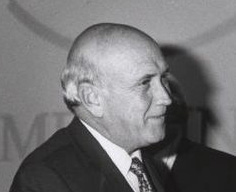
In this scenario, Najib would actually have the best chance to be a reformer, somewhat like FW de Klerk of South Africa. He could become the broker of a multiparty deal that can ensure Umno and the BN’s survival after the transition.
In brief, because Najib is ultimately a younger Abdullah, the only way he would be serious about reforms is a near-miss like Abdullah’s in 2008.
Najib appears to be trying to appear to champion moderation, while Umno-controlled Utusan Malaysia often takes extreme positions. Why the apparent contradiction? Which is a more accurate reflection of Umno’s values? Can and will Najib lead Umno down the path of moderation?
That is like Media Prima’s control of the private television industry. Why don’t TV3, ntv7, 8TV and TV9 all show similar programmes? Because they would only capture the same market segment. The apparent contradiction between Umno and Utusan is perfectly rational. It is much like in Penang – Umno accuses the DAP-led state government of marginalising the Malays, and the MCA accuses the same government of sidelining the Chinese. As long as the communities live in their own cocoons, these contradictions are but segregated realities.
Given his background, not unlike Khairy Jamaluddin, I genuinely believe Najib does not believe in the ultra ethno-nationalism championed by Utusan or Ibrahim Ali. Privately, he may have a strong contempt towards them. At the end of the day, Najib probably craves the West’s recognition more than any of his predecessors. All things being equal, I believe he would love to look democratic, liberal and inclusive. After all, who would enjoy being condemned every now and then in the New York Times?
Umno’s real driving value is pragmatism. It will do whatever keeps the party elites in power, which requires taking care of its core constituents – the Malay-Muslim community. If the Malay Muslims have no taste for ethno-religious exclusion, or the minorities cannot stomach it anymore, Umno-BN would move away from communalism, like Mahathir did after 1990.
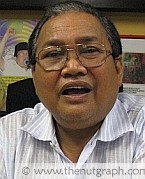
Utusan and the likes of Ibrahim Ali are valuable only if they add to Umno-BN’s electability. If they turn out to be poisonous for elections, they will be abandoned immediately. So far, Umno and Najib believe that they still have some market.
So, Najib’s job is not about moderation, but coordination – coordination in market differentiation, so that the company, Umno-BN, can maximise its market share. If the market wants only moderation, Najib will follow the market’s lead. He is a smart political entrepreneur, albeit lacking foresight and decisiveness. ![]()
Wong Chin Huat is a Bersih 2.0 steering committee member. He is also a political scientist by training and a journalism lecturer by trade. If readers have questions and issues they would like Wong to respond to, they are welcome to e-mail editor@thenutgraph.com for our consideration.
Read previous Uncommon Sense columns


Ibrahim Ah Lee says
Rational analysis, but I feel sickened by a PM and government that do not champion for the good of the people but only for themselves.
Terry_Arron says
I honestly believe that Najib wants to have liberalisation of our nation’s socioeconomics but his family history forbids him to.
Kong Kek Kuat says
@ Terry_Arron
Hahahahahahahahahaha… Bwahahahahahaha…
Ok, that was a good laugh.
Now, if his father, as was claimed by Najib himself, was the first prime minister of Malaysia to officially visit communist-China (which, mind you, was an earth-shattering event back in those days), I´d say Najib´s family history demands that he does something which will honour it, such as liberalising our socioeconomics.
Andrew Wilkins says
Najib, unfortunately for Malaysia, has his name linked to the death of a Mongolian woman in the past, and has shown his leadership to be poor. He talks about unity but is a racist ! He has no principles for leadership and is not a good example of what a prime minister should be. He is definitely NOT for the Malaysian people but for himself and what he can benefit from leadership. Any sane Malaysian citizen would vote Najib out of office.
Hang Tuah Benar says
A leader who bought his popularity with taxpayers’ money! A leader with flip-flop lips and tongue! A leader who is a hypocrite and two-faced actor! A leader with a cunning and cheeky face! A leader who is linked with tons of scandals! A leader who has done nothing constructive since he became a so-called ‘leader’!!!